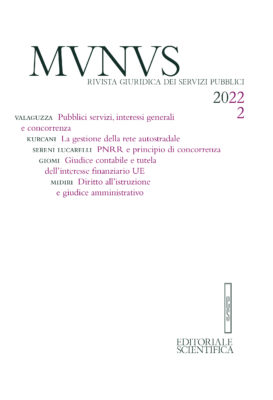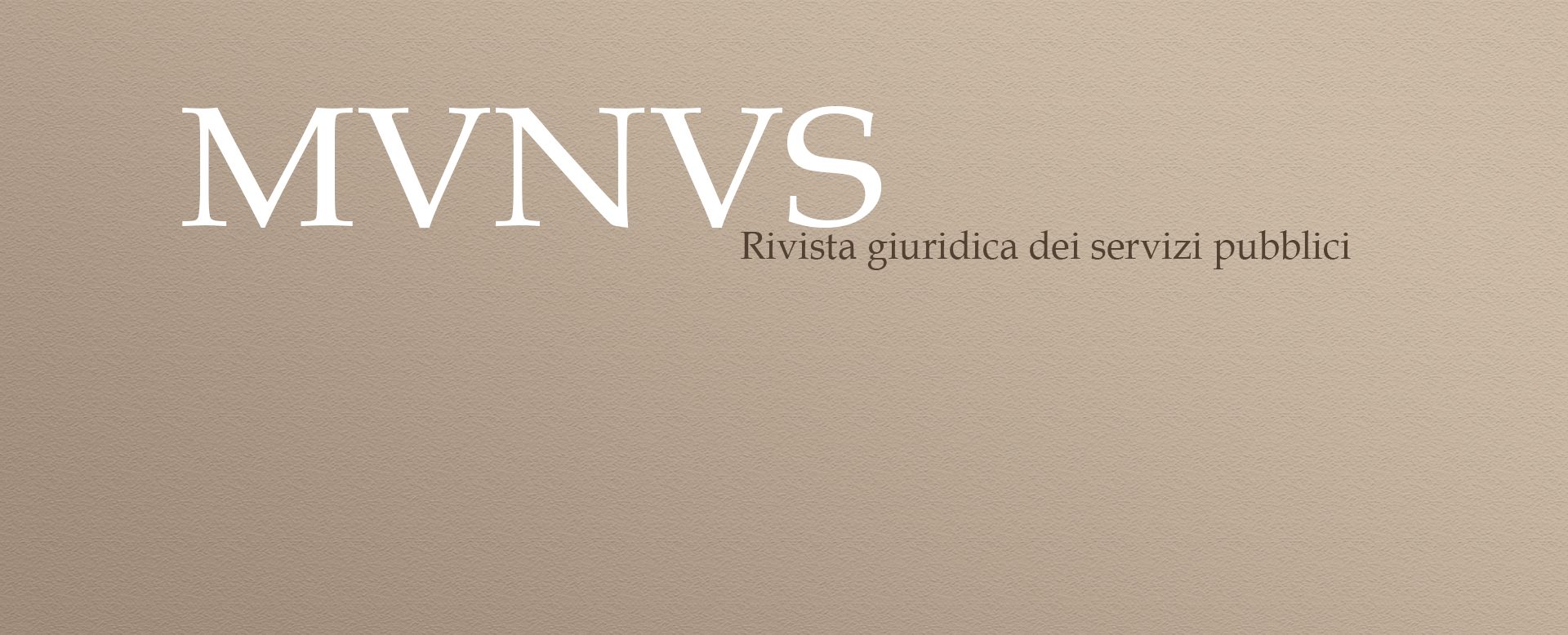
Autore rivista AA.VV.
ISSN 2240-4732
Prezzo rivista Italia € 100,00
Prezzo singola rivista (Italia)€ 30,00
Prezzo rivista estero€ 280,00
Link per acquistare la rivista: Editoriale Scientifica
Saggi
Sara Valaguzza, Pubblici servizi, interesse generale, privative e modelli concorrenti (anche alla luce del nuovo testo unico sui servizi pubblici locali)
The contribution can be considered part of the broader scientific debate on the definition of public service. This essay aims at reconciling the political nature inherent in the public service regime with the freedom of private economic initiative. In doing so, the paper starts with a reflection on the meaning of legal monopoly and exclusive rights, that are traditionally considered immanent to public service. This way, the contribution intends to demonstrate the possible coexistence of different methods: that of public service and that of economic activity of general interest. In fact, the latter, although their own logics, are not necessarily antagonistic, but rather reconcilable and synergic.
Klaudia Kurcani, La gestione della rete autostradale: quale ruolo per lo Stato?
Starting from a general overview of the motorway infrastructures, the contribution examines the management solutions for the highway system. The legal instrument that emerges from this analysis is the concession. In fact, the public administration has the choice to outsourcing or insourcing the management of the motorway network. In the first case, public tendering is established as the general rule. However, its implementation is at the crossroads between strategic profiles and critical issues. In the second case, the in-house solution too presents some problematic nodes that risk relegating it to a residual hypothesis. In this panorama, a fundamental role is played by the State, whose presence appears to be crucial for the management of the motorway network.
Cecilia Sereni Lucarelli, Riflessioni sul principio di concorrenza tra Pnrr, affidamenti in house e libertà di impresa
After some considerations about the main measures envisaged by the Nrrp and by the Annex to the Plan on competition and taking into account also the annual competition law 2021, the Author analyses the possible consequences of the provisions related to in-house providing on the current legal framework, focusing on the debate concerning the obligation to state reasons. In the second part, the reasoning on the principle of competition moves to the context of service concessions awarded without a tender and competition is analyzed in its innovative relationship with the freedom of enterprise, taking into consideration the decision of the Constitutional Court n. 218 of 23 November 2021.
Articoli
Giulia G. Cusenza, modelli di gestione del rischio assicurativo nei servizi sanitari regionali. Il caso dell’amministrazione sanitaria del Friuli-Venezia Giulia
The essay focuses on the phenomenon of self-insurance models in the healthcare system, weighing its benefits and potential issues. The article proceeds with the study of the “centralized management of RCT/RCO liability coverage” model adopted by the Friuli-Venezia Giulia healthcare administration. The study aims at analysing the distinctive features of the adopted self-insurance model, and evaluate the results achieved. The main goal is to understand whether self-insurance models, when properly tailored and implemented, especially through the deployment of new technologies and a proper collection and elaboration of data flows, can result in a tool capable of increasing the efficiency of healthcare administrations.
Valentina Giomi, Dimensione unitaria dell’interesse finanziario europeo e frammentazione delle tutele. Gli (auspicabili) spazi del giudice contabile nel rafforzamento della protezione di un bene giuridico comune
The paper analyses the issue of the European financial interest and its protection. It highlights the lack of an active role of the national Court of Auditors in the protection of a common legal asset. Furthermore, it specifies that the national accounting judge is equipped to provide adequate legal protection to the common European financial interest. It is then clarified that the accounting process is the most appropriate instrument to provide judicial protection to the European financial interest. The current procedural model followed by the accounting judge is specific and updated. It is hoped that soon the Court of Auditors will have a direct and active role in this field and that the current system of protection of directly managed funds will be strengthened. This will provide a more comprehensive protection for the European financial interest that characterises the European funds under direct management.
Alessio Martini, Sulla rilevanza giuridica delle attività funebri tra vecchie esigenze e nuove prospettive
The article aims to systematise funeral activities in the Italian framework by highlighting their main legally relevant features and verifying whether they can be qualified as public service or local public service activities. To this end, the analysis moves from the main doctrinal approaches of this topic and takes into account the regulatory trends, both the existing legislation and the law being established.
Francesco Midiri, Il diritto all’istruzione nella giurisprudenza amministrativa recente
The study analyses the indications of the most recent administrative jurisprudence, largely conditioned by the covid emergency, and considers how they have progressively outlined a figure of the right of education innovative and multifaceted, (linked) based more on the methods of implementing the principles of public school service than on the contents didactic to be transmitted, and, in any case, instrumental to the fullest realization of the constitutional aims of education.
Federica Marconi, Golden power e geopolitica della protezione: primi orientamenti giurisprudenziali e futuri scenari
The paper focuses on the cyclical comeback of the role of the State in the economy, especially in times of crisis, and on its ability of adapting and changing according to the new challenges and to the shifting social, political and economic environment. In doing so, the so-called “golden power”, i.e. the special powers that the State can use to protect strategic assets against predatory acquisitions. Taking as a starting point two recent rulings by the Lazio Regional Administrative Court on the subject, the paper seeks to investigate its founding principles as defined by the Administrative Court’s decisions called upon to scrutinize the choices made by the Government, paying particular attention to the critical issues related to procedural profiles and to the nature of the powers involved. Finally, potential and future developments are scrutinized, according to the latest national and European measures adopted to face the Russian-Ukrainian conflict.

